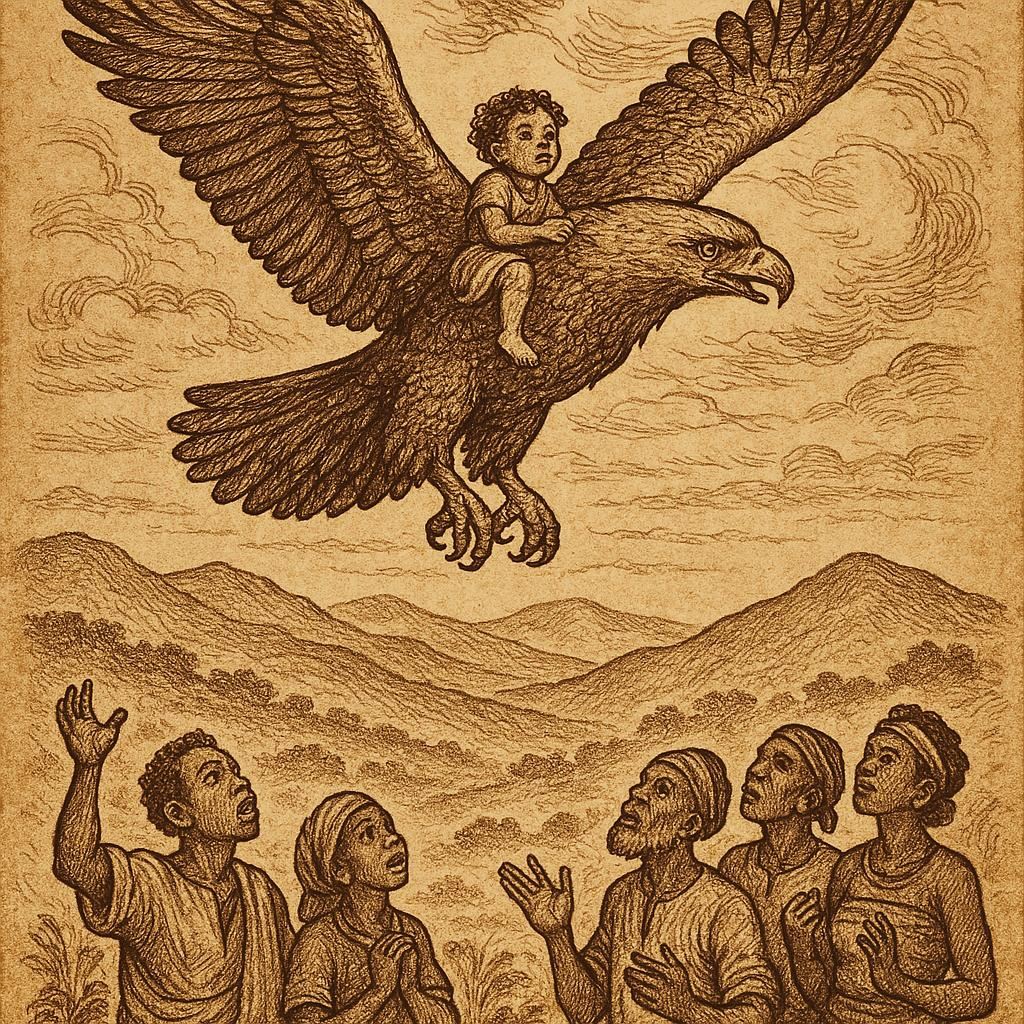Long ago, in the hills and forests of Togo, a child was born under unusual signs. The villagers whispered that he was destined for greatness, a leader who would guide his people with wisdom and courage. From the moment he was born, an unusual eagle watched over him from the skies, circling high above and observing the infant with sharp eyes. The villagers admired the child but also feared the power that fate had placed upon him, knowing that such a destiny could not be delayed or stopped.
One night, as the village slept under a blanket of stars, the eagle swooped down silently. With great strength, it lifted the child from his home and carried him to a hidden nest high in the cliffs. The villagers awoke to find the child gone and feared that he had been taken by spirits or wild animals. Yet the eagle’s purpose was not harm; it was protection. The bird understood that the child’s destiny was too important to be left vulnerable. In its nest, safe from harm, the child was nurtured and watched over.
READ THIS: The Girl Who Spoke with the River
The eagle fed him with care, bringing fresh fruits, small animals, and water from the mountain streams. The child grew strong, agile, and wise under the eagle’s watchful gaze. He learned to observe the world with keen eyes, to listen to the wind and the forest, and to understand the balance of nature. The eagle taught him patience, courage, and respect for all creatures, lessons that no human teacher could have given. Though he lived far from the village, the child’s mind and spirit developed with a clarity and wisdom that marked him for the greatness foretold at his birth.
As the child grew older, the eagle sensed that the time had come for him to return to the people. One morning, with wings outstretched, the bird carried him across rivers and valleys until the familiar village appeared in the distance. The villagers, astonished to see the child descending from the sky on the back of the eagle, recognized him instantly. They saw the strength in his posture, the intelligence in his eyes, and the calm courage in his movements. The child had returned, not as a mere boy, but as one destined to lead, ready to fulfill the promises of his birth.
The people gathered around, eager to learn from him, and he spoke with wisdom that far exceeded his years. He guided them with fairness, settled disputes with insight, and brought prosperity and harmony to the village. The eagle, having completed its duty, soared into the sky, a silent witness to the fulfillment of destiny. From that day, the villagers understood that the forces of nature, when aligned with fate, could protect and guide those chosen for greatness.
The story of the eagle and the child spread throughout the hills and forests of Togo, teaching generations that destiny cannot be stopped. The eagle’s protection symbolized the guardianship of nature, while the child’s growth and return showed that great leaders are shaped by both nurture and circumstance. The villagers honored the tale with songs, dances, and stories, reminding young and old alike that courage, wisdom, and patience are gifts nurtured over time, often by unseen forces.
Moral Lesson: The story of the eagle and the child of destiny teaches that destiny cannot be prevented and that protection from nature and guidance from wise guardians ensure the fulfillment of fate. True leadership arises from patience, courage, and wisdom cultivated through experience and care.
Knowledge Check
Why did the eagle carry the child away from the village?
Answer: The eagle carried the child to protect him from harm and ensure that his destiny as a wise leader would be fulfilled.How did the child grow and learn while with the eagle?
Answer: The child grew strong, wise, and observant, learning patience, courage, and respect for nature from the eagle.How did the villagers react when the child returned?
Answer: They were astonished and recognized his strength, intelligence, and courage, understanding that he had returned destined to lead.What role did nature play in the child’s destiny?
Answer: Nature, through the eagle, protected and guided the child, showing that natural forces can help fulfill destiny when aligned with fate.What is the main theme of The Eagle and the Child of Destiny?
Answer: The main theme is that destiny cannot be stopped, and leadership and greatness are nurtured through protection, guidance, and experience.How did the child demonstrate his destiny upon returning?
Answer: He guided the villagers with wisdom, settled disputes fairly, and brought prosperity and harmony, showing that his leadership had been nurtured and prepared.
Source: Togolese oral tradition, Ewe and Kabye communities. Referenced in African Folktales (Princeton University Press, 1964).

